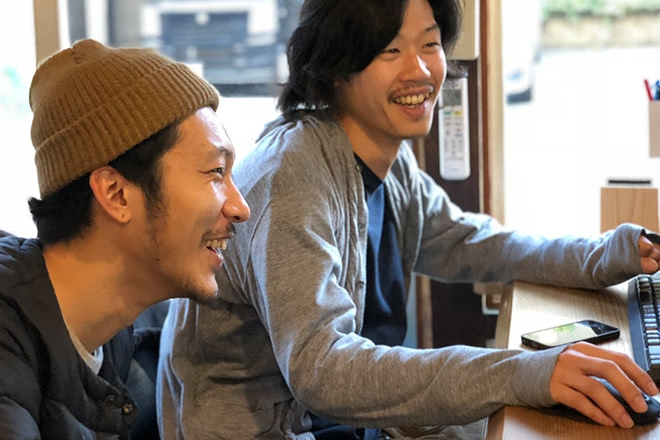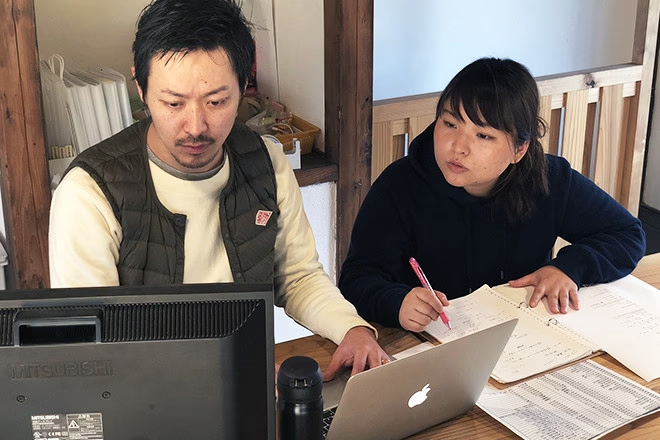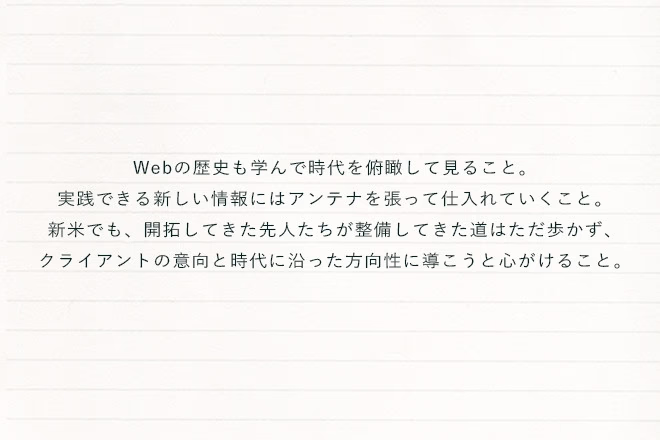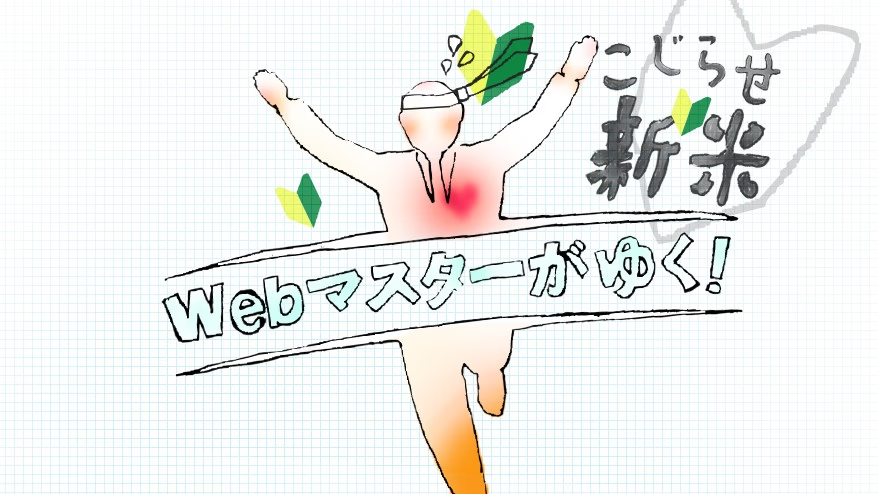My name is Sawada and I work in the Kamiyama satellite office, in charge of operations!
It has been a year since I joined the company and started working. My current main duties include creating designs for updating the website operation, as well as designing landing pages, creating banners, and creating wireframes.
The "webmaster" I aspire to be is someone who can handle anything related to website operation. However, I have no experience in the web industry. I started my days as a new webmaster with some anxiety, wondering if I would be able to handle the work of a full-fledged webmaster.
A new webmaster's early difficulties
At first, everything was new to me, and even though I couldn't do it, I found it interesting. However, I knew I wasn't very good at it, and every time new things came along, it got more complicated. What I had to do and what I had to remember were completely different for each project... My hands were full with the work in front of me every day. I didn't know what I didn't know! With the multitasking that came up one after another, I quickly got the impression that I couldn't do it well and I wasn't good at it.
Symptom 1: I can't remember the flow.
The first problem was that I found it harder to remember the work than I had expected.
There were many more detailed flows than I had expected, and they differed for each project. My previous method of following the meaning of each one, checking them, and building a flow over time did not work.
Until I could change the way I did things, there were many gaps in reporting, communication, and consultation. Not only was everything falling apart, but I also had daily quotas that I had not yet completed and new tasks that were increasing, and I suddenly became anxious.
Symptom 2: Seniors seem unusually tough.
The next thing that bothered me was that when I watched the senior webmasters in front of me, I was intimidated by how they were able to navigate the enormous waves of multitasking with such tenacity.
<Senior Webmaster Duties>
・Regular operation and update work (schedule adjustments, meetings, design creation, etc.)
・Team task management ・Training new employees (reviewing handover content, explaining procedures, corrections, and task management training)
・Consideration of new projects (securing resources, consultation, coordination)
My seniors spend most of their day outside of their regular work, such as teaching and managing team tasks, working late every day. Even so, they don't show any signs of dissatisfaction, and if I'm in trouble, they help me until the problem is solved. More than feeling "amazing" and "thankful," I felt "Is it really necessary to reach this level?"

A senior webmaster (left) is checking the design of a fellow designer (right). I'm not the only one being trained.
Symptom 3: Daily tasks…! They just look like a wall.
When I continued to be unable to adapt, I stopped thinking about how to improve my daily work.
For example, our work can be written as follows:
- This month's feature page has been updated (following the previous year's structure)
The materials were changed to this year's, and compared with the catalog (paper medium),
Please check the tortoiseshell area. - Product model change (page structure unchanged)
Changes in wording and functionality:
Create wires and images, and replace and update them while checking the materials.
There are few jobs that require big changes, and we just operate steadily. (Of course, there are also jobs that require big changes and renewal.)
What does it mean to "operate steadily"? If you are not conscious of this point, the task in front of you will be like a wall without individuality. Because you cannot see the big picture of the work, you are not conscious at all of "devising" or "improving".
It's terrible to write it down again... Even though the situation had become so complicated, the person in question was overwhelmed. He was not able to view the situation objectively.
New Webmaster Finally Finds His Footing
Seeing me stuck at a loss, they started by physically limiting my workload. Then, by teaching me how to manage my tasks again, I gradually got used to the work and started to have more time to myself.
However, what came out of that wasn't the joy of "I can do it now!", but the vague feeling of "Hmm, I don't feel very excited..." It was only when I had some free time that I realized that I hadn't accumulated anything within myself.

I'm learning the basics of task management from a veteran webmaster.
The "operations" work that I am in charge of.
On this Monosasu website, it is described as a " Webmaster Agency Service ."

Actual page
To be honest, I was a little hesitant to say this.
Every time I heard my seniors say, "Our basic stance is to handle anything related to website operation and updates," I wondered where they got that kind of unfathomable energy and wondered if I would ever be able to become a webmaster like that.
So, once again, I was stuck, so I asked the senior webmasters about various things from various angles, such as the journey they had taken since joining the company, when they felt like they had become independent, what made them happy, etc. As always, the seniors listened to me carefully, but what I learned was that we were starting from very different points.
Multitasking seems like "just a barrier" to me, while my senior sees it as normal.
The clue to the difference lies in the process of growth of operations.
In the first place, the number of operational cases started to increase and a specialized department was created about four years ago. At that time, many sites were still undergoing trial and error in terms of operation, and it was easier to understand the issues that needed to be resolved, including renewals. Since then, with the evolution of the Web, the importance of the operational phase and the scope of work have steadily increased.
Indeed, the history and the warmth that I have cultivated with our customers are different from those of my seniors who supported Monosus's operations team in its pioneering period. I was hired at the Kamiyama satellite office and have hardly ever met customers face to face. It was here that I first realized that there was a big difference between me and myself, who is in the midst of learning little by little the operations cases that my seniors have prepared.
I realized that just doing what I was given and doing what I was told would not motivate me to do anything like my seniors, and I feel like a little weight has been lifted off my shoulders. At the same time, I may never be able to become like my senior webmasters unless I understand the difference and create opportunities for myself to grow.
The journey of a new webmaster to becoming the main person in charge
In parallel with talking to my seniors, I also did my own research on the topic of "Web Masters." Among the many articles on blogs and seminars, a word in a column by NEC Management Partners really resonated with me. It also linked to what I had talked to my seniors about, so I'd like to introduce it here.
The real job of a webmaster.
What moves it is "your own mind" and "people's feelings."
In the first place, the job of a webmaster is to be a producer who is responsible for the positioning and direction of the website, and the website itself is at its core the company's business and is a communication tool aimed at the people to whom you want to convey that business.
The web is communication.
I was carrying out the daily operations as if it were a matter of course, but I was only concerned with the work in front of me and never paid any attention to what my customers, the webmasters, were seeing.
Looking back at the notes I had taken, I noticed many hint keywords such as "what the customer really wants," "facts," and "the true meaning of the request." I had heard these basic concepts over and over again, but I hadn't really internalized them, so I reflected on the fact that they had slipped through my mind.
When you change your perspective, your awareness will naturally change.
From now on, I will need to learn the history of the Web and take a bird's-eye view of the times. At the same time, it is important to keep an eye out for new information that can be put into practice. Just because I'm a newbie doesn't mean I can just follow the path that my predecessors have paved, but I want to keep in mind the importance of trying to lead my clients in a direction that is in line with their intentions and the times.

In fact, one of the goals I was given in my first year at the company was to have a main project. I am in charge of a variety of projects, but I have not yet become a full-fledged "main person in charge." And my first year is almost over.
I couldn't clear my first year's goal. I think it's only natural because I made so many mistakes. I'm still too new in terms of skills and experience, so I don't know when or how I'll make mistakes again, but I want to try to see how far I can go with the answers and intuition I came up with this time.
Senior webmasters all agree: "Once you learn how to do it, it's definitely fun."
I have a feeling that will happen too.

